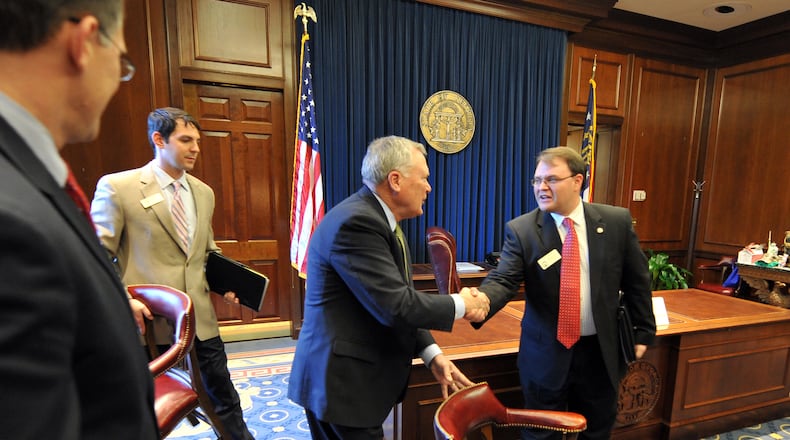What House Bill 3 would do
House Bill 3, which state Rep. Jason Spencer, R-Woodbine, has proposed for the legislative session that begins Jan. 9, would do two things:
- It would insert this line into the state's anti-masking bill:
“For the purposes of this subsection, the phrase ‘upon any public way or property’ includes but is not limited to operating a motor vehicle upon any public street, road, or highway.”
- It would also amend the state's currently male-specific anti-masking law that was originally aimed at the Ku Klux Klan to say:
“A person is guilty of a misdemeanor when he or she wears a mask, hood, or device by which any portion of the face is so hidden, concealed or covered as to conceal the identity of the wearer and is upon any public way or public property or upon the private property of another without the written permission of the owner or occupier of the property to do so.”
Women would be barred from wearing burqas and veils while posing for photos on Georgia driver’s licenses under legislation filed for the upcoming session of the General Assembly.
House Bill 3, filed by state Rep. Jason Spencer, R-Woodbine, would also subject female Muslim garb to the state's anti-masking statute — which originally was aimed at the Ku Klux Klan.
The need for the changes are unclear. Bert Brantley, the commissioner of the state Department of Driver Services, said wearing burqas in state license photographs is already prohibited.
“We have agency rules against any kind of facial covering,” Brantley told The Atlanta Journal-Constitution. “We have to be able to see from below the chin to above the eyebrows.”
Spencer said his legislation is intended to apply to women operating motor vehicles on public roadways, but the wording also suggests the restriction might apply to any kind of public property.
When asked whether his bill was designed to ban burqas on all public property, Spencer said, “No.” But he declined to elaborate on the need for the bill or why women should not be allowed to wear burqas while driving. He later told Channel 2 Action News that his bill “is simply a response to constituents that do have concerns of the rise of Islamic terrorism, and we in the state of Georgia do not want our laws used against us and to take advantage of us.”
The proposal is likely to become entangled with the broader debate over "religious liberty" legislation likely to be reintroduced in the General Assembly session that begins Jan. 9. A key proponent of past "religious liberty" bills, state Sen. Josh McKoon, R-Columbus, on Wednesday said he opposes Spencer's bill.
“Passing laws that clearly abrogate the free exercise rights of fellow Georgians will do nothing but create additional fear and division,” McKoon said on Facebook, adding that he understands the necessity of driver’s license photos showing one’s entire face. “But we should not give in to a fear of religious traditions that some may not value or understand — after all we live in a country founded on the idea that all of us are entitled to the right of free exercise, not just those government deems worthy.
Spencer's bill has spurred bipartisan opposition. House Minority Leader Stacey Abrams, D-Atlanta, called the measure "bigoted" and a "direct result of the rhetoric we heard during Donald Trump's Islamaphobic presidential campaign."
Atlanta attorney Andy Clark said he does not believe Spencer’s bill would have any practical effect. The state Supreme Court in 1990 wrote that the Anti-Mask Act only prohibits “mask-wearing conduct when the mask-wearer knows or reasonably should know that the conduct provokes a reasonable apprehension of intimidation, threats or violence.”
In light of that, Clark said, “I don’t think (Spencer’s bill) really does anything.”
Given its apparent lack of impact, Clark said he wondered what Spencer’s true intent is.
“A separate issue is whether HB 3 is motivated by any sort of anti-religious animus,” he said. “It seems that it probably is. Why else propose a bill that doesn’t do anything? But I don’t think the courts would even have to get to that issue.”
Anthony Kreis, a law professor at the Chicago-Kent School of Law and a former University of Georgia professor who has testified against “religious liberty” legislation at the Capitol, said the bill appears designed to target Muslim women unfairly.
“It is clear he’s trying to target disfavored women’s religious clothing,” Kreis said. “If the intention was different, he could have crafted a narrow exception within the proposed amendment to the Anti-Mask Act.”
In addition, he said, “if burqas obstruct drivers and hinder them from safely operating a vehicle, then the General Assembly should reconsider the use of helmets for motorcyclists.”
“The legislation, in its totality, seems motivated by the bare desire to harm,” Kreis said.
The head of the Georgia chapter of the Council on American-Islamic Relations agreed.
“Very few Georgia Muslim women wear face veils,” Edward Ahmed Mitchell told Channel 2, “but those who do have a constitutional right to do so.”
About the Author
Keep Reading
The Latest
Featured



